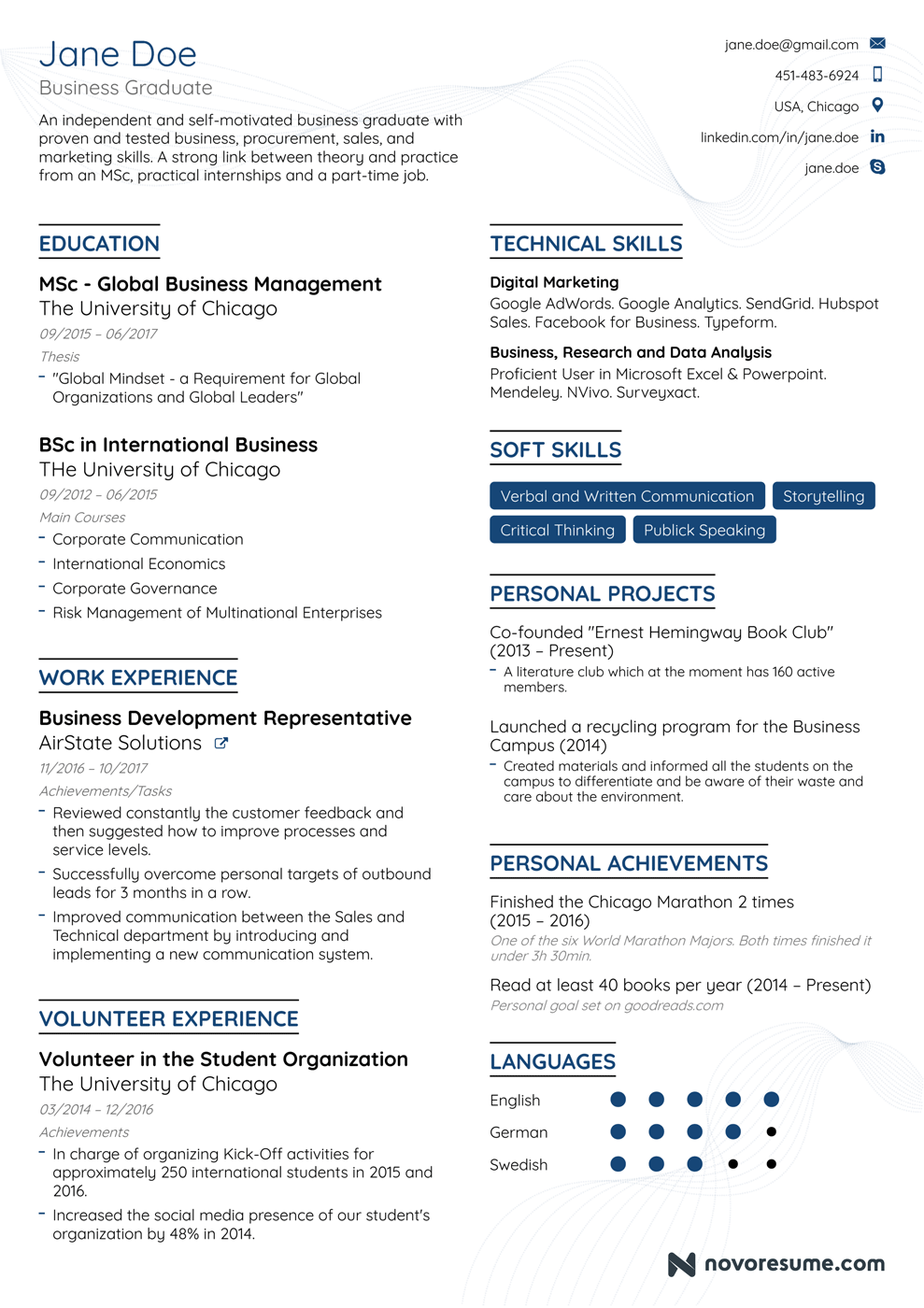Time to get a job to support your plans and kick off your mission to leave a mark on the world?
We’re here to help.
Whether you’re looking for your first part-time job to support your studies or internship or if you’re a fresh graduate looking for your first full-time job, you’ve come to the right place.
Here’s how we’re going to help you write your first student or graduate resume.
In a few minutes, you’ll hear four resume skills and insights that’ll last your entire working life:
- The 6 sections to include in your resume
- What a resume summary is – and how to write yours
- The 10 student skills every employer needs
- How to stand out from the crowd
Let’s follow the Jane Doe’s Novorésumé-created example throughout this guide.
Student and Graduates Resume Writing
Graduate Resume Sample

Here's more related resume examples that you might be interested in:
- College Resume
- High School Resume
- No Experience Resume
- Internship Resume
- Research Assistant Resume
- Teacher Resume
Sections to Include in a Student or Graduate Resume
Here’s a quick overview of the sections that you should include in every resume you write, regardless of how you customize it for each job advertisement or speculative cover letter.
- Contact and Professional Social Media details. List your professional email address – (not that ‘hilarious’ one you signed up for when you were 13!) – your phone number, and your professional social network profile).
- Professional Resume Summary: A summary for a resume needs to dash off your professional achievements and your skills that are relevant to the job ad.
- A Relevant Professional Title: A professional title for a resume will need to match the position/title that is advertised in the job ad, such as ‘media graduate, junior developer, or paralegal’.
- Education and certificates: Include your thesis, if it’s relevant, and add key courses related to the job. Include your grade point average, scholarships or university medals – if you have them.
- Relevant Experience: Don’t stress about this, we all started somewhere. Include any paid, unpaid or volunteer roles you held during your studies. No experience? No worries! Skip over to this dedicated guide with resume tips for students with no experience yet.
- Skills and expertise: Wizard at Word? Proficient in Photoshop? Google Ad Words guru? Make sure to include your key hard and soft skills (more on this soon).
What about those ‘nice-to-have’ but not mandatory sections?
Here’s a few you can put in or leave out, based on the role and your own judgement.
- Conferences, courses and certificates
- Student organizations, clubs, or networks
- Publications and awards
- Volunteer Experience
- Personal Projects
Think you already have enough information to create your student or graduate resume?
Check out our intuitive resume builder, job-hunting tips and resume examples to help you choose the best resume template to reach recruiters and hiring managers.
How to Write a Resume Summary for a Student or Graduate Resume
Let’s get moving on the content of your resume, starting with your resume summary.
Hold up! Wondering what a resume summary is?
It’s quite straightforward.
Basically, a resume summary it’s a short paragraph at the start of your resume which sums up your experience and suitability for the role.
It’s a bit like that elevator pitch you might hear people talk about in movies, start-ups or sales-driven business areas.
Instead of pitching a company or idea, you pitch you – and the benefits and value you bring, but there is no need to mention everything - for example, your work for an essay service may raise some eyebrows.
Time for us to look at Jane’s resume to see this in action.
Her summary is clear and direct.
Being in business means knowing about a lot of interconnected areas and Jane shows that she is versatile by highlighting her ‘proven and tested’ skills in procurement, marketing and sales – just some of the key areas that every solid business professional needs.
- “An independent and self-motivated business student with proven and tested business, procurement, sales, and marketing skills.”
- “An award-winning and confident communication graduate, able to establish rapport quickly and conduct training sessions with clarity and enthusiasm.”
Top Skills to Include in a Student or Graduate Resume
Let’s take a look at some of Jane’s skills now.
She includes a nice mix of technical (hard) and soft skills on her resume.
She talks about her proficiency with Google advertising technology, Typeform, and SendGrid, while highlighting four in-demand soft skills.
Now you might be worried that you don’t have any of the skills Jane lists in her resume.
Don’t worry, we bet you have plenty that you can include once you give it some thought.
Your hard skills will differ drastically based on what you’ve studied too.
And here’s a little secret that will lift your confidence and readiness to complete your resume.
There are some Soft Skills that almost every single employer will need.
Here they are:
- Communication
- Teamwork
- Adaptability
- Punctuality
- Organization
- Flexibility
- Problem Solving Abilities
- Motivation
- Patience
- Persuasion
How many of them would you add to your college resume template?
How to Stand Out From the Crowd as a Student or Fresh Graduate
You clever clogs out there are probably asking: “What if you share these skills with many other applicants?”
How on earth do you stand out?
Simple: you highlight your individual achievements and how they relate to the job.
Jane does this by linking her past work and volunteer experience to results. She successfully overcame personal targets – suggesting she’s driven – for three months in a row.
This kind of example is a really strong way to show a high-performance attitude, without bragging or claiming ‘I’m a high performer’. It’s showing, not telling.
A lack of experience is one of the big worries that students and graduates have when first applying for jobs and working on new resumes.
Look how Jane solves this problem by highlighting her leadership in event planning and social media while at University.
Feeling inspired? Ready to create a resume that helps you get that interview?
Suggested Reading:


